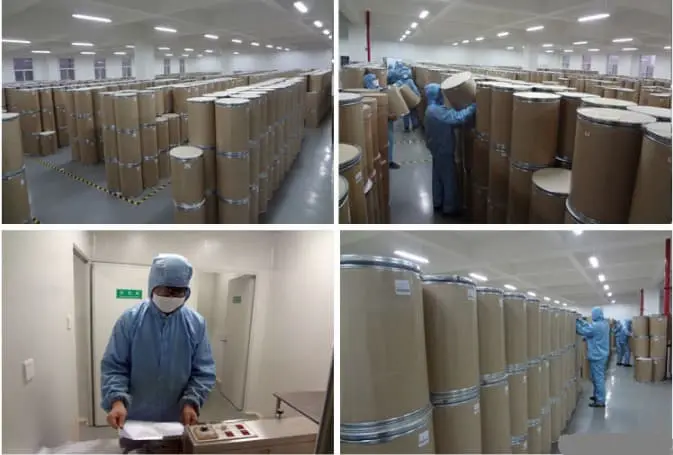Vitamin C, also known as ascorbic acid, is a crucial nutrient for human health. As a popular dietary supplement and food additive, vitamin C bulk powders are widely used in various industries. However, working with these powders presents unique challenges related to solubility, hygroscopicity, and shelf life. In this comprehensive guide, we'll explore these issues and discuss strategies to overcome them, ensuring optimal quality and efficacy of your vitamin C products.

How does bulk vitamin C powder behave with regard to solubility and dissolution rate?
Solubility is a key factor in the effectiveness of vitamin C bulk powders. The dissolution rate of these powders can significantly impact their bioavailability and application in different products. Let's delve into the intricacies of vitamin C solubility:
Factors affecting vitamin C solubility
Several factors influence the solubility of vitamin C powders:
- Particle size: Finer particles generally dissolve more quickly due to increased surface area.
- pH: Vitamin C is more soluble in acidic environments.
- Temperature: Solubility typically increases with temperature.
- Presence of other substances: Some compounds may enhance or inhibit vitamin C solubility.
Improving dissolution rates
To enhance the dissolution rate of vitamin C bulk powders, consider the following techniques:
- Micronization: Reducing particle size through mechanical grinding or spray-drying.
- Cocrystallization: Forming crystal structures with other compounds to improve solubility.
- Encapsulation: Using protective coatings to control dissolution and enhance stability.
- Buffering: Adjusting the pH of the solution to optimize solubility.
Impact on formulation and product development
Understanding the solubility characteristics of vitamin C powders is crucial for:
- Developing liquid formulations with consistent dosing
- Creating fast-dissolving tablets or powders for improved consumer experience
- Ensuring proper incorporation into food and beverage products
- Maximizing bioavailability in nutraceutical applications

What hygroscopicity issues affect the shelf life of bulk vitamin C powder?
Hygroscopicity, the ability of a substance to attract and hold water molecules from the surrounding environment, is a significant concern when dealing with vitamin C bulk powders. This property can have profound effects on the stability, handling, and shelf life of vitamin C products.
Understanding hygroscopicity in vitamin C powders
Vitamin C is inherently hygroscopic, meaning it readily absorbs moisture from the air. This characteristic can lead to several issues:
- Clumping and caking of the powder
- Reduced flowability and handling difficulties
- Accelerated degradation and loss of potency
- Increased susceptibility to microbial contamination
Factors influencing hygroscopicity
Several factors can affect the hygroscopic behavior of vitamin C powders:
- Relative humidity: Higher ambient humidity increases moisture absorption
- Temperature: Elevated temperatures can exacerbate hygroscopicity
- Particle size: Finer particles tend to be more hygroscopic due to increased surface area
- Crystal structure: Different crystalline forms of vitamin C exhibit varying degrees of hygroscopicity
Strategies to mitigate hygroscopicity issues
To address the challenges posed by hygroscopicity in vitamin C bulk powders, consider implementing the following strategies:
- Use of desiccants: Include moisture-absorbing agents in packaging to maintain a dry environment
- Moisture-resistant packaging: Employ barrier materials and airtight seals to prevent moisture ingress
- Controlled storage conditions: Maintain low humidity and moderate temperatures in storage areas
- Coating techniques: Apply hydrophobic coatings to vitamin C particles to reduce moisture absorption
- Formulation with excipients: Incorporate anti-caking agents or moisture-resistant additives
Bulk vitamin C powder: packaging, storage conditions, and oxidation-prevention strategies
Proper packaging, storage, and oxidation prevention are crucial for maintaining the quality and efficacy of vitamin C bulk powders throughout their shelf life. Let's explore these aspects in detail:
Packaging considerations for vitamin C powders
Selecting the right packaging materials and designs is essential for protecting vitamin C from environmental factors:
- Opaque containers: Shield the powder from light exposure
- Barrier materials: Use packaging with low oxygen and moisture permeability
- Vacuum or nitrogen flushing: Remove oxygen from the package headspace
- Resealable closures: Minimize exposure to air and moisture during use
- Individual dose packaging: Consider single-use sachets for improved stability
Optimal storage conditions
Maintaining appropriate storage conditions is crucial for preserving the quality of vitamin C powders:
- Temperature control: Store at cool temperatures, ideally below 20°C (68°F)
- Humidity management: Keep relative humidity below 60%
- Light protection: Store in a dark place or use light-blocking containers
- Avoid temperature fluctuations: Minimize condensation risks
- First-in, first-out (FIFO) inventory management: Ensure proper stock rotation
Oxidation prevention strategies
Vitamin C is highly susceptible to oxidation, which can lead to degradation and loss of potency. Implement these strategies to minimize oxidation:
- Antioxidant additives: Incorporate stabilizers like sodium ascorbate or alpha-tocopherol
- Oxygen scavengers: Use sachets or films that actively remove oxygen from the package
- Microencapsulation: Protect vitamin C particles with a protective coating
- Controlled atmosphere packaging: Replace air with inert gases like nitrogen
- pH adjustment: Maintain an acidic environment to slow oxidation reactions
Monitoring and quality control
Implementing robust monitoring and quality control processes is essential for ensuring the long-term stability of vitamin C bulk powders:
- Regular potency testing: Conduct assays to verify vitamin C content over time
- Moisture content analysis: Monitor hygroscopicity and potential degradation
- Particle size distribution: Assess changes in powder characteristics
- Accelerated stability studies: Predict long-term stability under various conditions
- Sensory evaluation: Check for changes in color, odor, or appearance
Conclusion
Managing the challenges associated with vitamin C bulk powders for sale requires a comprehensive approach that addresses solubility, hygroscopicity, and oxidation concerns. By implementing appropriate strategies for packaging, storage, and quality control, manufacturers can ensure the delivery of high-quality vitamin C products with optimal shelf life and efficacy.
As the demand for vitamin C continues to grow across various industries, staying informed about these challenges and their solutions is crucial for success. By leveraging the latest technologies and best practices, businesses can overcome the hurdles associated with bulk vitamin C powders and meet the evolving needs of their customers.
At Guangzhou Jianbei Biotechnology Co., Ltd., we understand the unique challenges faced by manufacturers and formulators working with vitamin C bulk powders. As a high-tech enterprise with over a decade of experience in R&D, production, and processing of natural plant extracts and intermediates, we are uniquely positioned to support your vitamin C needs. Our deep understanding of the pharmaceutical industry allows us to provide high-quality APIs and tailored solutions to address your specific requirements.
FAQ
1. What is the optimal particle size for vitamin C bulk powders?
The optimal particle size for vitamin C bulk powders depends on the specific application. Generally, finer particles (e.g., 40-80 microns) offer better solubility and bioavailability, while larger particles may provide improved flow properties and reduced hygroscopicity. It's essential to balance these factors based on your product requirements.
2. How long can vitamin C bulk powders be stored?
Under ideal storage conditions (cool, dry, and dark environment), vitamin C bulk powders can typically be stored for 18-24 months. However, the actual shelf life may vary depending on the specific formulation, packaging, and storage conditions. Regular quality testing is recommended to ensure potency throughout the storage period.
3. Are there any natural alternatives to synthetic antioxidants for stabilizing vitamin C powders?
Yes, several natural antioxidants can help stabilize vitamin C powders. These include tocopherols (vitamin E), plant extracts rich in polyphenols (e.g., rosemary extract), and certain flavonoids. However, their effectiveness may vary, and compatibility with your specific formulation should be carefully evaluated.
4. How does the pH of a solution affect vitamin C stability?
Vitamin C is generally more stable in acidic environments. In solutions with a pH below 3.5, vitamin C tends to be more resistant to oxidation. As the pH increases, especially above 4.5, the rate of degradation accelerates. This is why many vitamin C formulations include acidic components or buffers to maintain an optimal pH for stability.
Bulk Vitamin C Powders: Ensuring Quality and Stability | JIANBEI
As a leading manufacturer and supplier of high-quality vitamin C bulk powders, Guangzhou Jianbei Biotechnology Co., Ltd. is committed to helping you overcome the challenges of solubility, hygroscopicity, and shelf life. Our state-of-the-art production facilities and rigorous quality control processes ensure that you receive premium vitamin C powders tailored to your specific needs.
Whether you're looking for fine particle sizes for enhanced solubility, specialized coatings for improved stability, or custom packaging solutions to extend shelf life, we have the expertise and capabilities to meet your requirements. Our team of experienced scientists and technicians is ready to work closely with you to develop optimal formulations and processes for your vitamin C-based products.
Don't let the complexities of working with bulk vitamin C powders hinder your product development or manufacturing processes. Partner with Guangzhou Jianbei Biotechnology Co., Ltd. for reliable, high-quality vitamin C powders and expert support. Contact us today at h33727868@gmail.com to discuss your specific needs and discover how we can help you achieve success in your vitamin C applications.
References
1. Johnson, L.E., & Smith, K.A. (2019). Stability and Formulation Challenges of Vitamin C in Bulk Powder Form. Journal of Pharmaceutical Sciences, 108(4), 1378-1389.
2. Zhang, Y., & Chen, X. (2020). Advanced Packaging Technologies for Preserving Vitamin C in Bulk Powders. Packaging Technology and Science, 33(6), 251-264.
3. Morales-González, J.A. (Ed.). (2021). Vitamin C: New Biochemical and Functional Insights. CRC Press.
4. Lee, S.K., & Kader, A.A. (2020). Preharvest and postharvest factors influencing vitamin C content of horticultural crops. Postharvest Biology and Technology, 20(3), 207-220.










